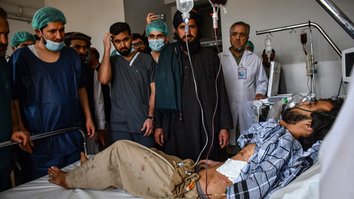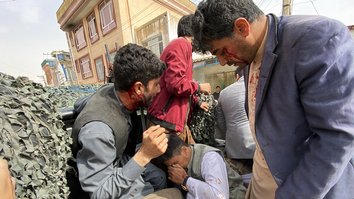HERAT -- Empowered by the power vacuum in Afghanistan, the "Islamic State of Iraq and Syria"'s Khorasan branch (ISIS-K) has been increasing attacks in several provinces, raising serious concerns about security across the country.
In two separate strikes in Mazar-e-Sharif earlier this month, ISIS attacked a senior local government official and a ceremony for journalists.
Police said a security guard was killed, while several journalists and three children were wounded in the March 11 attack on the Tabyan Cultural Centre in Mazar-e-Sharif, the capital of Balkh province.
Besides that guard, journalist Hossein Nadiri and a journalism student named Akmal were killed, according to the Afghan Independent Journalists' Association (AIJA). Another 14 media workers were injured, it said.
The bombing came just two days after an ISIS suicide bomber killed the governor of Balkh province at his office in Mazar-e-Sharif.
Three people were killed in another ISIS attack on March 9 in Herat.
Victims of ISIS's bloody game
By increasing the frequency of its terrorist acts, ISIS is trying to turn Afghanistan into a bloody ideological battlefield, according to some analysts.
"Recent ISIS attacks show that the group has become very active and has expanded its activities to different parts of the country," said Mohammad Naim Ghayur, an Italy-based military analyst.
"Dozens of terrorist groups are active in Afghanistan, and ISIS's relationship with them is improving," he said.
"As these groups unite, not only the security of Afghanistan but the entire world's security will face increasing threats."
"If the current situation continues, we will witness bloody ISIS attacks in several provinces," he predicted.
ISIS-K's activities will likely expand across the country and the terrorist group will seize territory unless an inclusive government that is supported by the people is established in Afghanistan, Ghayur said.
"ISIS is strongly supported by regional countries and intelligence agencies," he said. "Without that intelligence support, ISIS would not be able to carry out such complex and bloody assaults."
"Unfortunately, the actual victims of this bloody game are innocent Afghans," he added.
ISIS is trying to start a war in Afghanistan, said Sayed Ashraf Sadaat, a civil society activist in Herat.
"ISIS has grown significantly in the past year and a half," he said. "Its activities in Afghanistan are a serious concern."
"Many regional countries want to keep the war in Afghanistan going to achieve their intelligence and political goals. This is why ISIS receives extensive military and financial support," he said.
"There are many militant forces now at loose ends in Afghanistan, which ISIS has been able to recruit from," he added.
Serious threat to global security
Without a strong and professional military, Afghanistan has turned into a haven for terrorist groups such as ISIS, said Ahmad Saeedi, a political analyst based in Uzbekistan.
"ISIS has extensive financial resources and can easily expand its activities," he said. "The current situation in Afghanistan has established a platform for ISIS to grow."
"ISIS is a global movement, and its Khorasan branch, which operates in Afghanistan, Pakistan and some other countries in the region, is very active now."
"Instead of some Arab countries such as Yemen, Syria, Iraq, and some African countries, ISIS has concentrated its activities in Afghanistan and Pakistan," he said.
The threat of ISIS from Afghanistan to the world is very serious and containing it will be very difficult unless powerful countries jointly suppress ISIS-K, Saeedi said.
"The objective of the group is creating instability and insecurity -- not just in Afghanistan but around the world," he added.
ISIS is turning Afghanistan into its command centre and co-ordinates most of its attacks across the region from Afghanistan, said Abdullah Khalil, a former Afghan military officer based in Herat city.
"ISIS is doing very well in terms of recruiting and seizing territories because the lack of political and military stability in Afghanistan," he said.
"The group can recruit the unemployed cheaply and can easily obtain weapons and ammunition."
"The fight against ISIS in Afghanistan needs a strong military force to attack its nests," he said. "It is very difficult to stop the bloody attacks by the group unless its safe havens in some provinces are destroyed."
To save Afghanistan and the world from ISIS, all countries must jointly suppress the group in Afghanistan as they did in Syria and Iraq, Khalil said.
Living in fear
The increase in ISIS attacks and in the threat the terrorist group poses has worried Afghans.
Abdul Khaliq Muntazem, 31, said he lost his brother in an ISIS attack on the Jawadia mosque in Herat city in 2017.
He is afraid that ISIS will once again attack the mosque or the school where he works and kill him or his relatives.
"I can never forget the pain and sorrow ISIS brought to my family," he said. "My young brother went to the mosque to pray, but ISIS blew him to pieces. ISIS does not spare people even in the house of God."
"I've been so scared in light of recent ISIS attacks," he said. "I do not go to the mosque at night, fearing that an ISIS member might blow himself up among the worshippers."
ISIS is the biggest enemy of Afghans as it has proven that it spares no one, said Safiullah Alokozai, 26, a resident of Nimroz.
"Last week, ISIS attacked a ceremony organised by journalists, in which Afghan journalists were killed and wounded," he said, referring to the March 11 Mazar-e-Sharif bombing. "What is the justification?"
"What is the crime of journalists and the rest of the civilians killed by ISIS? This shows that ISIS has no values and that its activities are inhuman and un-Islamic."
"ISIS receives money from abroad but massacres innocent and impoverished Afghans," he said.
"I am worried about the current situation, and I am afraid that ISIS will kill more innocent Afghans by increasing its attacks."

![A wounded man is assisted near the site of an ISIS attack during an event commemorating the media in Mazar-e-Sharif on March 11. [Atif Aryan/AFP]](/cnmi_pf/images/2023/03/23/41312-33ay784-highres-585_329.jpg)






